Related Research Articles
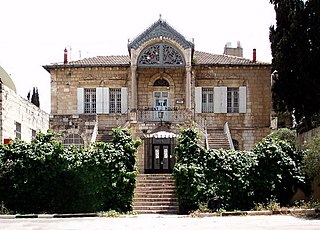
Orient House is a building located in Jerusalem that served as the headquarters of the Palestine Liberation Organization (PLO) in the 1980s and 1990s.
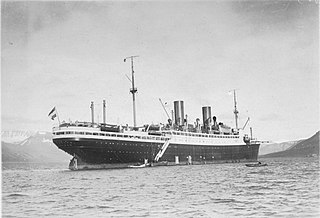
SS General von Steuben was a German passenger liner and later an armed transport ship of the German Navy that was sunk in the Baltic Sea during World War II. She was launched in 1923 as München, renamed General von Steuben in 1930, and renamed Steuben in 1938.

Johann Peter Hebel was a German short story writer, dialectal poet, Lutheran theologian and pedagogue, most famous for a collection of Alemannic lyric poems and one of German tales.
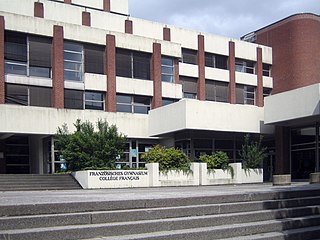
The Französisches Gymnasium is a francophone gymnasium in Berlin, Germany. Traditionally, it is widely regarded as an elite high school. It is also the oldest public school in Berlin. Its creation was ordered by Frederick William of Brandenburg.

St. John Cantius School is a high school in Poznań, Poland named after the scholar and theologian St. John Cantius.
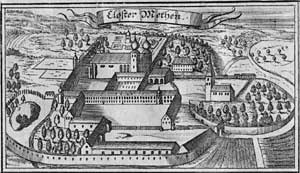
Metten Abbey, or St. Michael's Abbey at Metten is a house of the Benedictine Order in Metten near Deggendorf, situated between the fringes of the Bavarian Forest and the valley of the Danube, in Bavaria in Germany.

Wettenhausen Abbey was an Imperial Abbey of Augustinian Canons until its secularization in 1802–1803. Being one of the 40-odd self-ruling Imperial Abbeys of the Holy Roman Empire, Wettenhaussen Abbey was a virtually independent state. Its abbot had seat and voice in the Imperial Diet, where he sat on the Bench of the Prelates of Swabia. At the time of secularization, the Abbey's territory covered 56 square kilometers and it had about 5,400 subjects.
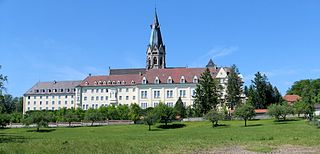
St. Ottilien Archabbey is a Benedictine monastery in Emming near Eresing and the Ammersee in the district of Landsberg, Oberbayern, Germany. It is the motherhouse of the St. Ottilien Congregation.

Pocking is a town in the district of Passau, in Lower Bavaria, Germany. It is situated about 30 km south-west of Passau, close to the Austrian border.

Sächsisches Landesgymnasium Sankt Afra zu Meißen is a boarding school for highly gifted students in the German city of Meissen, Saxony. Founded in 1543 as Fürstliche Landesschule and re-established in 2001, the stated aim of the school is to promote the intellectual and social development of highly gifted students. The costs for attending the school comply with the maxim of social balance; the boarding and schooling fees are considerably low in contrast to similar institutions. It is the first publicly funded school for highly gifted students in Germany and is a role model for similar schools.
Education in Hamburg covers the whole spectrum from kindergarten, primary education, secondary education, and higher education in Hamburg. The German states are primarily responsible for the educational system in Germany, and therefore the Behörde für Schule und Berufsbildung is the administrative agency in Hamburg. The Behörde für Wissenschaft und Forschung has the oversight for universities and colleges.

The Evangelisches Gymnasium zum Grauen Kloster, located in suburban Schmargendorf, Berlin, is an independent school with a humanistic profile, known as one of the most prestigious schools in Germany. Founded by the Evangelical Church in West Berlin in 1949 as the Evangelisches Gymnasium, it continues the traditions of the ancient Berlinisches Gymnasium zum Grauen Kloster, the oldest Gymnasium in Berlin, which for hundreds of years was situated in former monastery buildings in the city's Mitte district, closed by the East Germans in 1958. In 1963 the Evangelisches Gymnasium of West Berlin adopted its traditions and added "zum Grauen Kloster" to its name.

The Friedrichsgymnasium is a humanistic classical gymnasium, located in Kassel, Hesse, Germany, that focuses on music and foreign languages, particularly Latin and Ancient Greek. The mission statement of the school is to spread the ideas of humanism and tolerance and to ensure the students grow up to become independent, educated and responsible, following the school motto "Learn what you are and be such", a quote by the Ancient Greek poet Pindar. The school is a so-called "Gymnasium", a secondary school that offers the highest possible standards in education and aimes for the students to take their A-Levels, the "Abitur", in year 13. The school specializes in supporting highly gifted students and has a tradition of encouraging students to be competitive and exceed their limits. However, the school also highlights the importance of tolerance and solidarity, taking part in projects with hospitals and refugee organisations.

A gym, short for gymnasium, is an indoor venue for exercise and sports. The word is derived from the ancient Greek term "gymnasion". They are commonly found in athletic and fitness centres, and as activity and learning spaces in educational institutions. "Gym" is also the commonly used name for a "fitness centre" or health club, which is often an area for indoor recreation. A "gym" may include or describe adjacent open air areas as well. In Western countries, "gyms" often describe places with indoor or outdoor courts for basketball, hockey, tennis, boxing or wrestling, and with equipment and machines used for physical development training, or to do exercises. In many European countries, Gymnasium also can describe a secondary school that prepares students for higher education at a university, with or without the presence of athletic courts, fields, or equipment.

Albrechtsberg Palace or Albrechtsberg Castle is a Neoclassical stately home above the Elbe river in the Loschwitz district of Dresden. It was erected in 1854 according to plans designed by the Prussian court and landscaping architect Adolf Lohse (1807–1867) at the behest of Prince Albert, younger brother of the Prussian king Frederick William IV.
The Friedrich Wilhelm Gymnasium was a secondary school (Gymnasium) in Berlin.
WDG is an acronym that might stand for:

The Gymnasium Theodorianum is a grammar school situated in the historic centre of Paderborn, Germany. Succeeding in the tradition of the cathedral school founded in 799, it is among the ten oldest schools in the world. It continues in the ideals of Renaissance humanism, with Latin taught as the primary foreign language and Ancient Greek offered as an additional subject. The school has produced several leading German political, scientific, religious and military figures. It is known locally simply as the “Theo”.

Herbert Leuninger was a German Catholic priest and theologian. He was a human rights activist for asylum in Germany, a co-founder and speaker of the organisation Pro Asyl, helping refugees, and a member of the board of the European Council on Refugees and Exiles. He is remembered as a "loudspeaker" of refugees.
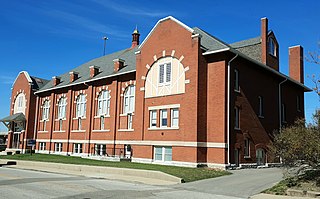
South Side Turnverein Hall is a historic social club and gymnasium in the Bates-Hendricks neighborhood of Indianapolis, Indiana, affiliated with the city's German-American community. lt was built in 1900 by prominent architects Vonnegut & Bohn, whose managing partners Bernard Vonnegut, Sr. and Arthur Bohn were members of the burgeoning German-American community in Indianapolis. The architects were also known for designing the Athenæum, another German-American social club in the city. The South Side Turnverein was an important gathering place for Indianapolis' south side German community until its decline in the 1940s. It was sold to investors in 1978 to be used as an athletic club.
References
- ↑ "Refugee host school bans revealing clothes" (Archive). The Local . June 26, 2015. Retrieved on September 10, 2015.